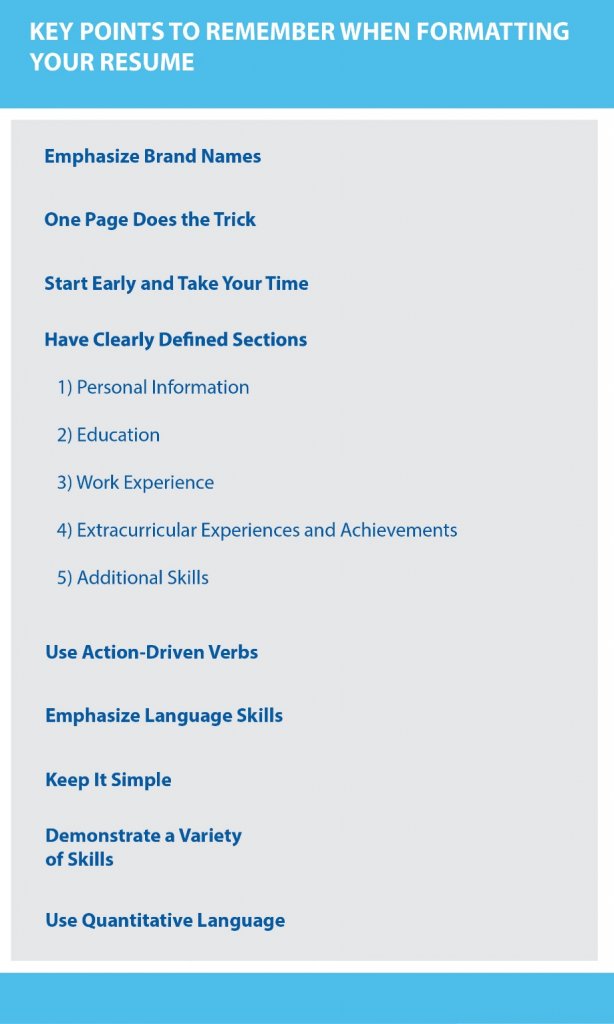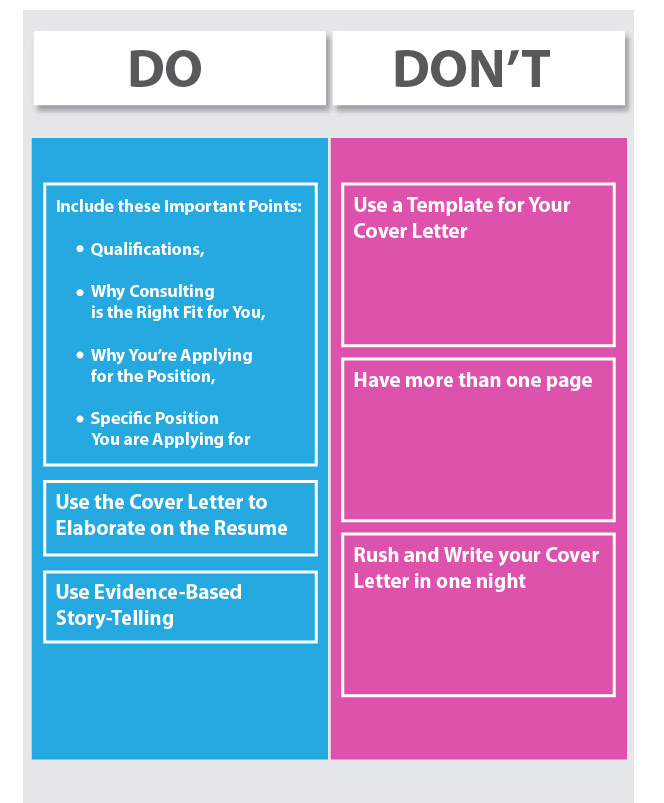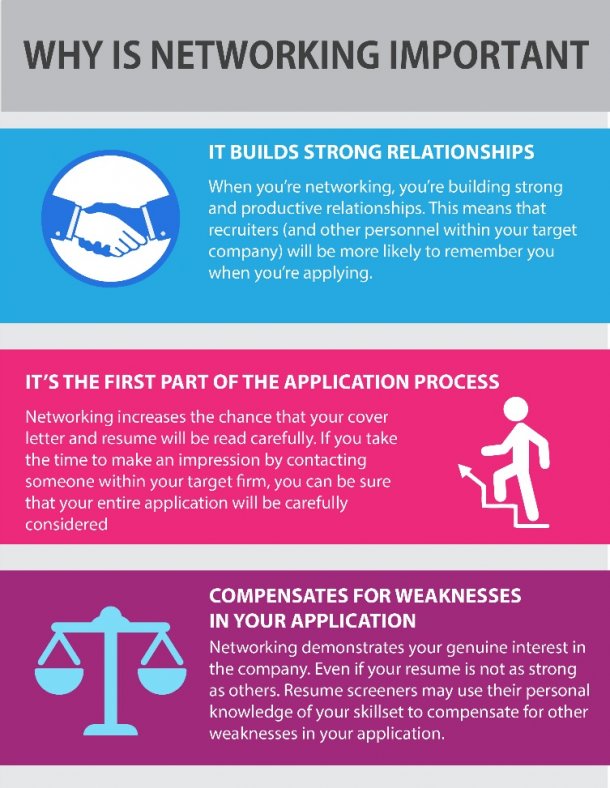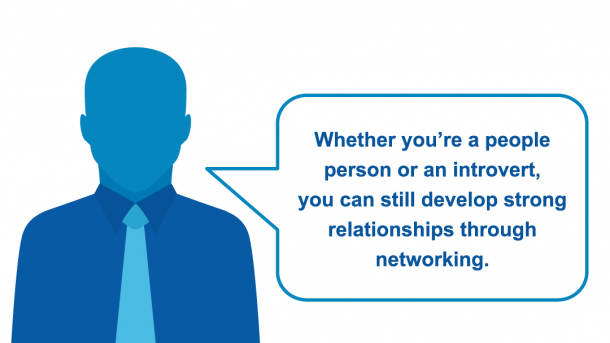
What you will learn:
Learn how to market yourself through your resume and cover letter so that you will get the interview. Also, find tips and strategies that you can use to network with people in the firm or position that you are applying for.
Topics Covered:
How to Write a Resume That Will Get You the Interview
Your resume is even more important in the consulting world than in any other profession. A consultant is a problem-solver, a data expert, and a communications professional, all bundled into one. Your resume needs to show all of these skills.
The top three consulting firms — McKinsey, Bain, and BCG — have acceptance rates of less than five percent during any given year. The resume screening step is where most applicants are eliminated. So, a strong resume is essential when you’re trying to get the interview.
Understand What Consulting Firms Are Looking For
In order to write a resume that will get you the interview, you must understand what top consulting firms look for when reviewing candidate applications. Screeners care less about proper formatting than they do about your qualifications and accomplishments.
During resume screening, top consulting firms will pay attention to the following components of your resume:
- Brand Name Schools and Employers. Top consulting firms have a weak spot for brand names. Clients love to know that they are working with a graduate from a top-tier school like Yale. This doesn’t mean that you can’t get a consulting position if you went to a non-target school. However, if you have brand names on your resume, make them easy to find.
- Academic Performance. Include your high GPA right next to the school and program information. Also include any high standardized test scores to demonstrate your academic prowess. If your GPA is lower than average, still include it. If you leave it out, they will either contact you to find out about it, or just assume it was low.
- Specific Skills Relevant to the Profession. Show soft skills, including leadership and communication. List experiences that demonstrate any of these qualities.
- Career Experiences. Talk about your career experience as well as what you achieved during your time in each position. Firms compare how long you were in that position with how much you achieved. So, emphasize outcomes and quantify them.
Properly Format Your Resume
Knowing what top consulting firms expect from your resume is just the beginning of resume writing. You should also know how to present your academic, professional, and extracurricular skills in a consulting resume. This comes down to proper formatting — presenting your qualifications in a manner that the resume screener can easily identify.
Here are key points to remember when formatting your resume:

- Emphasize Brand Names. Make sure the brand name schools that you attended, or big companies that you interned with, are clearly mentioned near the top of your resume.
- One Page Does the Trick. Condense your experiences and qualifications into one concise page that can be quickly evaluated.
- Start early. Take time to reflect on your most relevant experiences, how you’ll allocate bullet points, and how you can play around with margins and line spacing to fit everything on one page.
- Have Clearly Defined Sections. A typical consulting resume should be split into five clearly defined sections: 1) Personal Information; 2) Education; 3) Work Experience; 4) Extracurricular Experiences and Achievements; and 5) Additional Skills. These sections do not have to be in this order, but they must be addressed.
- Use Action-Driven Verbs. se Action-Driven Verbs. You have only seconds to attract the attention of your resume screener. So, it is essential that you give some thought to word choice. Start each bullet point with an action verb such as “led,” “initiated,” “solved,” “saved,” etc.
- Emphasize Language Skills. If you can speak multiple languages, the firm may view you as an asset for a specific market that they’re targeting. Being fluent in more than one language can set you apart from other applicants.
- Keep It Simple. Avoid industry-specific jargon when describing your accomplishments. Simplify this information in a manner that anyone can easily understand when reading through your resume.
- Demonstrate a Variety of Skills. Avoid falling victim to writing an incomplete resume. If you’ve worked as an engineer for multiple companies, don’t include the same job responsibilities repeatedly throughout your resume. Highlight unique experiences that demonstrate your diverse skill set.
- Use Quantitative Language. The consulting field is driven by data. Numbers, quantities, or other similar information can attract attention. As you outline achievements in your professional career, present them using quantified data.
How to Write a Cover Letter That Will Get You the Interview
Your cover letter can make a big difference when applying for a management consulting position. Because the cover letter is typically read BEFORE your resume, it plays an essential role when you’re trying to secure the interview. If your cover letter is weak, your resume will be discarded and not even read. If the cover letter is mediocre at best your resume will be skimmed for a few seconds as the reader is moving the letter to the reject pile.
Consulting firms will typically read your cover letter to quickly identify what makes you different from thousands of other applicants. A strong cover letter presents an excellent opportunity for you to demonstrate why you’re the best candidate for the job and to plead your case as to why the firm should hire you over other applicants.

Know What Consulting Firms Are Looking For
The top consulting firms receive hundreds of thousands of applications each year and only interview a fraction of those applicants. Interviewing candidates is not a cheap process, so consulting firms want to ensure that they only interview the most promising candidates.
Screeners look for four essential elements in a cover letter.
- Why you’re the right person for the position
- Why you wish to enter the consulting field
- Why you’re a good fit for their particular firm
- Your writing ability
Your cover letter is an excellent opportunity to emphasize your skills and experiences.It helps you to set yourself apart from other applicants.
Cover These Important Sections
While your cover letter doesn’t need to take a formulaic approach, there are five distinct sections that should be covered to help you get the interview. They are:
- An Introduction. The introduction should say which position you’re applying for and your contact information. It should be short, sweet, and entertaining. Write it in such a way that the screener will want to keep reading into the second paragraph.
- Your Qualifications. Each sentence should speak to your skills, education, and experiences — tying everything back to why you’re a great candidate. This section should include your top three achievements to date (relevant to consulting).
- Why Consulting is the Right Fit for You. Dedicate a section to explain why you’re the right fit as a management consultant. Use previous work or academic experiences to tie your career goals to the position in question.
- Why You’re Applying for the Position. Why did you choose to apply to this firm? To make a compelling argument, identify specific people, reports, or projects within the firm that have sparked your interest.
- A Solid Conclusion. Finalize the letter by restating why you believe that you’re a great candidate and how you can be of value to the company.
Use the Cover Letter to Elaborate on the Resume
Your cover letter should highlight the unique achievements, skills, and experiences on your resume. These documents need to work together to strengthen your application and get you the interview.
Focus on what you want the consulting firm to know about you, whether that’s career achievements, interesting career background, or impressive academic skills. Make sure that unique experiences are mentioned in the first few paragraphs of your cover letter to pique the interest of the resume screener.
Many resume screeners don’t actually read your entire resume — they simply scan it. Some resumes are tossed out without the screener reading valuable information. Prevent this from happening by drawing attention to your achievements in your cover letter.This will give you a better chance of securing an interview.
Do Not Use a Standard Template for Your Cover Letter
The biggest mistake you can make is to copy a standard cover letter template and simply plug in your name and skillset. They’re boring to read, and they show that you’re unwilling to put in the time and effort to write something unique.
While it’s okay to draw inspiration from a template, add your personal twist to each word and modify it to emphasize your unique skillset. For example, instead of starting with the usual format:
“Dear Sir/Madam, I write to apply for a consulting position….”
You can make things more interesting by starting off with what makes you different. Here’s an example:
“After attending Harvard for both my undergraduate and MBA education, I am confident in my ability to become successful as a [insert job position here] at McKinsey.”
Make every sentence in your cover letter count toward getting the interview. Add a personal twist to all of your skills and experiences. Tie them to the job responsibilities of the open position.
Use Evidence-Based Storytelling
Use your cover letter to tell your story. Instead of simply stating that you can lead, tell a story about an experience where you showed leadership qualities. Telling a story makes you stand out from other applicants who simply state “I’m a leader,” or, “I’m a hard worker.”
Tailor every experience you mention to a skillset that is required for the job. If the position requires a candidate with strong interpersonal skills, explain a time when you worked within a team to achieve tangible results. Tell stories that highlight why you’re a good fit for the job.
Why You Would Be of Value to the Firm
A common mistake that many applicants make is to only think about personal achievements when applying for consulting positions. They focus on how they can benefit personally from the position in question instead of demonstrating how they can become valuable employees.
Many candidates only cover how they will elevate their career with this position. But screeners are looking for candidates who will benefit the firm, not those who are simply using this as an opportunity to enrich themselves.
So, emphasize how your skillset will be of benefit to the company. Do research to find out what the goals of the firm are. Relate these goals to your unique abilities and experiences.
Be Specific About the Position that You’re Applying For
You should always state the position and office of the job that you intend to apply for within the first sentence. Here’s an example of an opening sentence that will make you stand out:
“My experiences overseas as a Peace Corps volunteer put me in a position to be successful as a Management Consultant at BCG.”
Being specific and concise about the job that you’re applying for will make it easier for screeners to quickly recognize which position you are interested in.
Take Your Time
Writing a strong consulting cover letter takes time. You need to consider everything that you’ve accomplished, as well as what makes you different from everyone else. You can’t write a strong cover letter in one night. It requires multiple iterations, careful re-reading, and timely feedback.
Keep the information from this section in mind as your craft your cover letter so that you can maximize your chances of securing the case interview.





How to Network Your Way to a Case Interview
While you may be familiar with how to write a strong resume and cover letter, don’t forget that networking also plays a big role in securing an interview. There are many elements to networking, but it can be broken down into one fundamental idea — building relationships.
Networking allows you to gain an edge over other applicants, especially in the more subjective parts of the application process. Simply put, networking makes resume screeners view your application with a more positive attitude.
But, why is networking so important during the application process? And, how can you get started with building these relationships? Let’s approach each question individually.
Why Is Networking Important?
You can think of networking in one of two ways: 1) As a way of increasing your chances of getting an interview; or 2)As a means of exploring new opportunities. Here’s why networking is important during the application process.

How to Network to Get an Interview

While many candidates know that networking is important, they may struggle to identify the best approach to use. Networking sounds confusing to some, and even intimidating to others. Whether you’re a people person or an introvert, you can still develop strong relationships through networking.
Here are a few useful tips:
Start by Making Connections with the Right People
The first step in networking is connecting with the right people. As part of your consulting application, think about the contacts who you may be able to approach within your target firm. If you aren’t able to get in contact with anyone in the firm, start reaching out to people who you have a personal relationships with to see if they have a connection with someone there.
Call your friends, your aunts, uncles, cousins, classmates, past professors. Send out the signal on Facebook and LinkedIn. Tell everyone who you are trying to meet and why. If they know someone who can help you, they can connect you with that person. If they don’t directly have a connection, maybe they know someone else who does.
If you tell 200 people about what you are trying to accomplish, and then they each tell 200 more people, that’s a network of 40,000 people! It may seem like a lot of work, but it will pay off. Someone in that 40,000 is bound to have a connection that can help you. So, don’t be shy, get the word out about your career goals.
Follow the Informational Interviewing Approach
Once you identify your targets, reach out to them in a way that is easy to respond to, like an email. Informational interviewing is a useful approach where you ask for helpful information instead of directly asking for a job. You may request pointers on how to strengthen your consulting resume. Or, ask for career advice related to the consulting field.
An informational interview also allows you to gain information about the firm you are applying to, the position you are applying for, and the kinds of traits that that firm values.
Use this information and provide specific examples in your cover letter. Tell them who you have connected with and what you learned about the firm. When you explain why you are interested in that particular firm, they will believe you because they know that you did your research.
Networking closely with people who are employed at the firm can also create unpredictable opportunities. The person that you connected with may have an in with the interviewer. They might be able to get your resume noticed or even get you an interview.
While it is not absolutely necessary, networking is an incredibly valuable tool to your success in securing an interview. You need to stand out from the competition and having connections within the firm will only increase your chances of doing just that.






How to Get an Interview as a Non-Target School Applicant
The application process for a management consultant is highly competitive, regardless of the firm that you’re applying to.
Because of this competitive environment, firms tighten their recruitment process so that they only hire the best candidates. This is why factors such as high GPA, brand name schools, and strong resumes/cover letters are so important to securing an interview.
However, you don’t have to be the class president at Harvard with a 3.9 GPA to get an interview. Candidates from non-target schools also stand a chance of getting a consulting position in a top tier firm if they follow the right approach.
If you are applying from a non-target school, consider following these tips:
Network
Networking is perhaps the most important thing that you should do when you apply from a non-target school. Remember that top tier firms want only the best talent, which is part of the reason why they recruit from brand name schools. But this doesn’t mean that candidates from non-target schools aren’t equally (or sometimes more) qualified.
It may be challenging to get the top tier firms to read your cover letter and resume carefully. Networking allows you to build meaningful relationships with specific people at the firms that you’re applying to so that you will have a better chance of getting their attention. Ultimately, the goal is to secure an interview.
Prepare and Persevere
Many successful applicants from non-target schools will tell you that preparation and perseverance are keys to getting an interview. Applicants from non-target schools often need to spend more time writing their resumes/cover letters, networking, and preparing for the interview than applicants from target schools.
The key to success in this situation is to have a specific strategy. For example, if your goal is to get into management consulting at McKinsey, your method and approach should fit that goal. Be prepared to reach out to more contacts, attend more networking events, and cold call more people of interest.
Most importantly, you need to persevere. The reality is that you may be rejected. Not getting an offer the first time around is not uncommon. As an applicant from a non-target school, you’ll need to work harder to get the attention of top consulting firms.
Build Relevant Experiences that Highlight Your Skills
Coming from a non-target school is already a strike against you. So, you will need to make up for this deficit in every way possible. This means highlighting anything that gives you an advantage over other candidates.
In addition to theoretical and analytical skills, you also need soft skills such as communication, leadership, and interpersonal skills. Having experiences that highlight these skills is key to securing an interview when you are applying from a non-target school.
Think about any unique experiences that you’ve listed on your resume. While work-related experiences (like internship programs) certainly help, also consider any relevant experiences outside of work. If you’ve worked or studied overseas and you know more than one language, frame that skill in a way that makes it valuable to the firm.
Similarly, achievements like scholarship awards, Olympic gold medals, and other extracurricular involvements can help you get noticed when applying. Whatever will help you stand out, use it to your advantage.
Additional Resources
If you found this post useful, I suggest becoming a registered member (it’s free) to get access to the materials I used to pass 60 out of 61 case interviews, land 7 job offers, and end up working at McKinsey.
Members get access to 6 hours of video tutorials on case interviews, the actual frameworks I used to pass my interviews, and over 500 articles on case interviews.
More Topics :

What is a Case Interview?

What Interviewers Look For

Case Interview Prep Resources
